The Road Of Peace Is Ours In One Step
THE ROAD OF PEACE IS OURS IN ONE STEP ~ ISSUE 200 ~ NOVEMBER 24, 2015
By Diane Gold
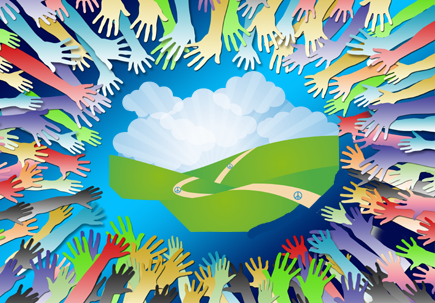 The road of peace is an ongoing mindset always to be acting, thinking, being peaceful and at peace. There are all kinds of strategies that cross our minds, our books and our conference tables. We are taught at a very young age not to be pushed around, to fight back, to go even the score.
The road of peace is an ongoing mindset always to be acting, thinking, being peaceful and at peace. There are all kinds of strategies that cross our minds, our books and our conference tables. We are taught at a very young age not to be pushed around, to fight back, to go even the score.
We are taught that we can go to a one-time peace rally and smile or that we must do something violent to save face. Both of these actions side-step the road of peace. One is on the road to peace, a forward looking approach where peace is not achieved but is pondered. The other is an egomaniacal approach to life.
PUBLISHER’S NOTE
Just a note. The road of peace is now, present. The road to peace is a future state. I am of peace and at peace now.
OUR FOCUS
How can we focus on vengeance and believe it is justice? Why is every cops and robbers/hackers TV show about getting the perpetrator for purposes of seeing justice serviced, which is usually a disguise for getting revenge. Why do we not create entertainment that changes society’s vengeful side by displaying and embellishing stories whose main sentiment is forgiveness and understanding? Why don’t the greatest minds in entertainment come up with creative ways to show conflict resolution in comedic and dramatic properties? We learn much from entertainment and art. Let’s step it up.
Why are we not looking at peaceful solutions to political, religious and national turmoil, instead of war? Why are we always in the conference room with our finger on the trigger?
The answer to that is that we want to be alive in case someone else pushes the red button of war first. But, we can set up our systems to warn against that and think on the road of peace. We know war brings hardship to all, temporary glory to some and a new cycle to come, which, so far, has always repeated itself. We all lose if we do not further the cause of humanity by coming up with a sustainable solution that requires being peaceful now.
The New York Times Editorial Board wrote an article about the price of fear. I quote,
“In the reaction and overreaction to terrorism comes the risk that society will lose its way.”
THE REACTION TO VIOLENCE – REPEATING THE CYCLE – OR NOT
I say, often times, we have tunnel vision. Person A, from Tribe A, steps on your land, so you, from Tribe B, shoot her. Person A’s daughter shoots you to honor her mother whom you have shot.
What if Person A had taught her children not to kill in retribution but to negotiate a peace to sustain the future so that Tribes A and B could live together? What if Person A were the first generation to begin teaching this method of reaction? And the next 10 generations of that family taught the way, no matter how many times Tribe B became violent? Very hard to do since our lives would be at risk. But, as one French person answered his son who said they had to move after the Paris bombings of November, 2015; he said that they didn’t have to move, there are bad guys everywhere, and, when his son mentioned guns, the father replied,
“It’s OK. They might have guns, but we have flowers.”
When the son said that flowers don’t do anything, what he repeated after his dad replied to him was,
“The flowers and the candles are here to protect us,”
and then he said that now he felt safe.
At some point, others would mimic the same pattern. At a further point, this method would rub off on others from other tribes. At some further point, TV shows would reflect this theme, and comedic and dramatic shows would use the theme to teach future generations.
THE TRICK
Someone has to be brave enough not to kill killers. Someone has to be balanced enough to be at peace first. This starts with each of us.
The next time each of us decides to have a social experience, we can go dancing, rather than join some angry crowd calling for vengeance. The next time each of us decides to act to make ourselves feel bigger, let us choose a different behavior.
ACTION STEP – CHANGING OUR REACTION HABITS
Let’s say we want to become more refined, constantly more elevated beings who surpass our animalistic tendencies that have come from the combination of our innate survival instincts and habits developed through repetition of action. This same habit formation that is part of us from early on can be used to replace the habits we have created, to re-develop the habit of peaceful behavior. Just by planning to do so in advance.
Let’s say we are always working on sustainable solutions on the road of peace. This means we are willing to put our insecurities, our anger and our well ingrained habits aside.
HOW TO BE ON THE ROAD OF PEACE
1) THE PLAN
In advance, plan a behavior to do within 2-5 seconds of feeling angry, vengeful, toxic feelings that show themselves or give you a warning that they are about to show themselves.
2) THE BEHAVIOR
Physically leave the location where you are, even if it’s a small adjustment. If possible, run around the block one time or your corporate building or your school campus. This will change the mind because you are involving a physical act which will change the biology from many angles.
3) REPETITION
Repeat the behavior the next time angry, vengeful, prejudicial, toxic feelings show themselves or give you a warning that they are about to show themselves.
4) MORE REPETITION
And the next 100 times.
5) CONTINUING TO TAKE THAT ONE STEP, A HABIT IS BORN OR REPLACED, ON THE ROAD OF PEACE
All habits remain. Whether they are dormant or active, that is the question. For us to be peaceful, we must be peaceful. If we get in our own way, we can get out of our own way. If we act in peace, we will contribute to peace, the peace within and without.
CONCLUSION
The road of peace is a fertile road. We are on it if we decide to read the road sign.
It is not necessary to believe this will work.
It is not necessary to believe in ourselves.
It is not necessary to think happy thoughts.
These three things may come to us in time if we commit to follow the action step. Action is the key. New action that is not the vengeful action of our foreparents is the way. Most of us are not genocidists. We are not in need of annihilating others. Or, if we are, we take the one action step I propose to replace that need.
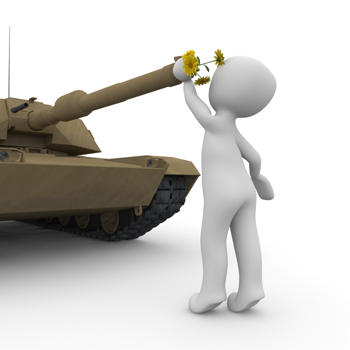 We are here to be kind and better our species, in creativity, productivity, to spread our message peacefully, to improve the way we gather our food and water, to be more educated about the way we enhance our health, to show love to each other, to care for the planet.
We are here to be kind and better our species, in creativity, productivity, to spread our message peacefully, to improve the way we gather our food and water, to be more educated about the way we enhance our health, to show love to each other, to care for the planet.
Being peaceful is the way and the road of peace. Becoming peaceful only takes one step.
![]()
![]()
![]()
If you wish to share your story, please hit reply in your email program to be contacted.
If you need habit help, go to warriorsofweight-consulting.
![]()
FEEDBACK
We value your feedback very much.
Please leave a comment below.
Please LIKE us on the website and at
WarriorsOfWeight on Facebook.
You can also follow us on Twitter @warriorsoweight.
Thanks.
![]()
DIANE GOLD, PUBLISHER AND AUTHOR
Diane Gold, Founder of Warriors of Weight, Turning Habits Into Health, is a mentor in tai chi, kung fu and meditation, a music, fitness and stress expert, dedicated mom, studying peaceful conflict resolution, habit replacement and certified in plant-based nutrition.
She believes that we can be on the road of peace in one step.
She says,
“We are developing habits all day long. Every day. Every time we repeat an action, we are one step closer to having an automatic habit. This means we are replacing habits, too. When we do something new in place of what we used to do to achieve the satisfaction of what made us act in the first place, we let go of some habits and let others shine through. Truthfully, we don’t really get rid of any habits. They stay with us forever. Some go dormant. Others stay at the forefront.
“To tie this in with peace, we develop habits when we feel certain things. When we itch, we scratch. What if we swam instead? We might replace scratching with swimming. The point is we can replace our habits of anger and vengeance which come from insecurity with those of being peaceful. In one step. We just have to plan the behavior we will do when we get the old feeling to become angry or vengeful.
“We don’t have to be ready, strong, a Democrat, believing it will work. None of that is even important. All we have to do is do a new action, and we will develop a new habit. It has worked with every human who is of sound mind so far.
“Do it. You will love it, and the world will thrive because of you and me.
“And, finally, let’s take overall good care of ourselves because we are so worth it.”
![]()
![]()

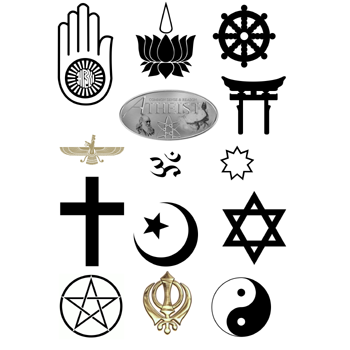 We are taught value systems when we are young which we accept or reject as we get older. We are exposed to rituals that accompany value systems, which we accept or reject as we get older. We always have the impressions of this exposure, no matter whether we decide to follow these systems or not.
We are taught value systems when we are young which we accept or reject as we get older. We are exposed to rituals that accompany value systems, which we accept or reject as we get older. We always have the impressions of this exposure, no matter whether we decide to follow these systems or not.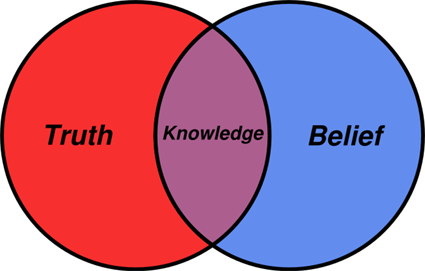
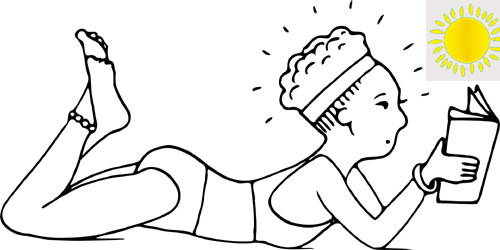 Women have Vitamin D deficiency. Men have it, too. Children who don’t go out a lot also have it. Get out more, and don’t be so prissy. What do I mean by that? For me, it means every time I go out, I shower upon return; so I go out less. That’s what I mean by prissy, and, yes, I am talking to myself.
Women have Vitamin D deficiency. Men have it, too. Children who don’t go out a lot also have it. Get out more, and don’t be so prissy. What do I mean by that? For me, it means every time I go out, I shower upon return; so I go out less. That’s what I mean by prissy, and, yes, I am talking to myself. The secret of Vitamin D is not deep and dark. It is transparent and light. Wait 3 hours for the glorious substance from the surface of our skin to convert and drip down into our grateful body. Marvel at the idea that we can store it. Be diligent and experimental about how much sun is required, being careful to avoid high noon, unless screened in some way.
The secret of Vitamin D is not deep and dark. It is transparent and light. Wait 3 hours for the glorious substance from the surface of our skin to convert and drip down into our grateful body. Marvel at the idea that we can store it. Be diligent and experimental about how much sun is required, being careful to avoid high noon, unless screened in some way.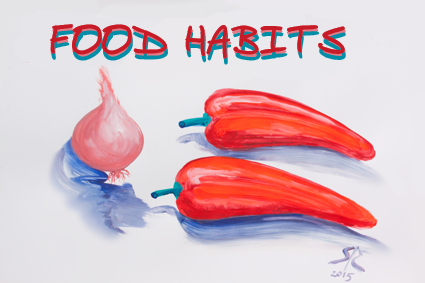 Food habits are developed in all of us. We consume the same foods or types of foods over and over again because we like the result. When we do a behavior repetitively to satisfy a certain desire, we have a habit. It becomes something we can do without thinking, and we find ourselves doing it almost automatically.
Food habits are developed in all of us. We consume the same foods or types of foods over and over again because we like the result. When we do a behavior repetitively to satisfy a certain desire, we have a habit. It becomes something we can do without thinking, and we find ourselves doing it almost automatically.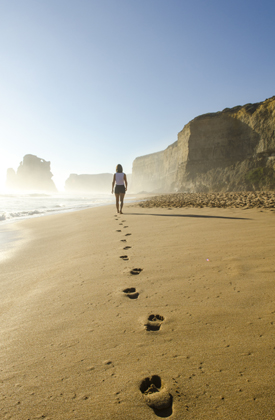
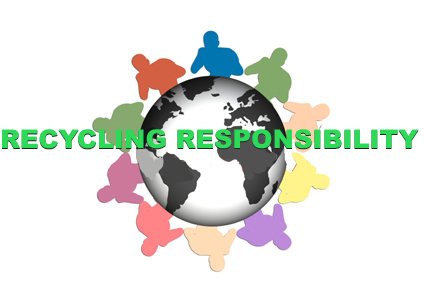 Recycling is our responsibility, a task that most of us choose to be environmental stewards and better our planet, present and future. We do it for ourselves, our families and our planet’s longevity. The amount of money companies make as a result of our actions is not of concern to most of us.
Recycling is our responsibility, a task that most of us choose to be environmental stewards and better our planet, present and future. We do it for ourselves, our families and our planet’s longevity. The amount of money companies make as a result of our actions is not of concern to most of us.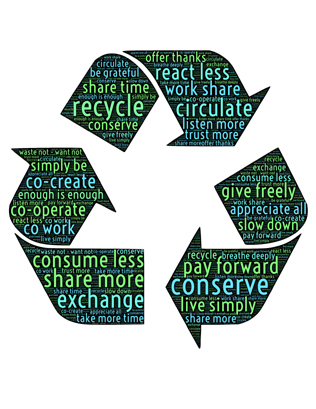 The first thing to keep in mind is that recycling is our responsibility for our home, whether it is a castle, a shack or the planet. We are not entitled to much after we become adults unless we work for it. As long as we put something in, we can create the best our situation has to offer. And, to prepare children to become responsible adults, recycling ed has to start immediately.
The first thing to keep in mind is that recycling is our responsibility for our home, whether it is a castle, a shack or the planet. We are not entitled to much after we become adults unless we work for it. As long as we put something in, we can create the best our situation has to offer. And, to prepare children to become responsible adults, recycling ed has to start immediately.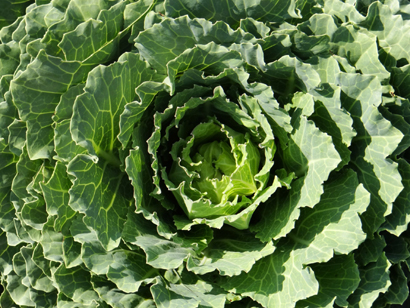 Just so we know, the term “conventional produce” is another way of labeling food that has pesticides, herbicides, fungicides and is made with seeds that are, more than not, genetically modified. The question becomes why are we accepting the term “conventional produce?”
Just so we know, the term “conventional produce” is another way of labeling food that has pesticides, herbicides, fungicides and is made with seeds that are, more than not, genetically modified. The question becomes why are we accepting the term “conventional produce?”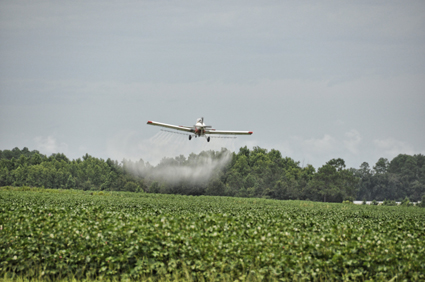 Another tidbit I’d like to mention comes from a true story in 2009 from a 152-year-old farm that had been working on becoming organic. The farmers, 5th generation in their family, were in their 3rd (which is the final) year of working the land following organic guidelines – it takes 3 years of organic protocols to get certified.
Another tidbit I’d like to mention comes from a true story in 2009 from a 152-year-old farm that had been working on becoming organic. The farmers, 5th generation in their family, were in their 3rd (which is the final) year of working the land following organic guidelines – it takes 3 years of organic protocols to get certified.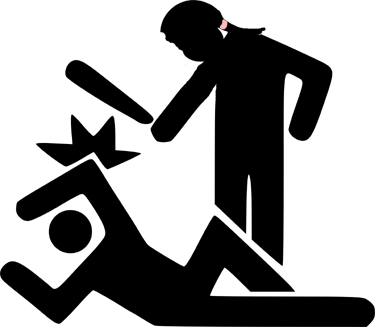 As an abuser, we get something out of the pain of others. What is so spectacular that we forfeit our love for others, our reverence for the rights of others, our sense of right and wrong, even our own dignity at the blink of an eye?
As an abuser, we get something out of the pain of others. What is so spectacular that we forfeit our love for others, our reverence for the rights of others, our sense of right and wrong, even our own dignity at the blink of an eye?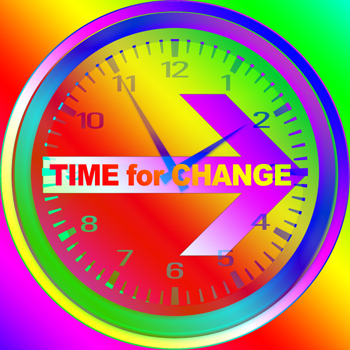
 When we are abused at home, we make choices. Some of us remove ourselves from the situation, which seems sensible. Others do not or cannot. This essay talks about why we do not even want to remove ourselves from such a situation.
When we are abused at home, we make choices. Some of us remove ourselves from the situation, which seems sensible. Others do not or cannot. This essay talks about why we do not even want to remove ourselves from such a situation.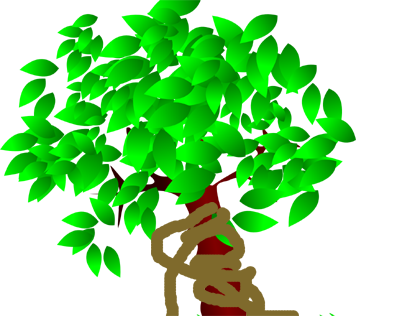 Attachment can truly entangle us. I am reminded of the Indian philosophy I studied at age 21 (Radha Soami). With that training and using what I have learned on the subject since then, I know attachment can consume us and hinder our ability to grow.
Attachment can truly entangle us. I am reminded of the Indian philosophy I studied at age 21 (Radha Soami). With that training and using what I have learned on the subject since then, I know attachment can consume us and hinder our ability to grow.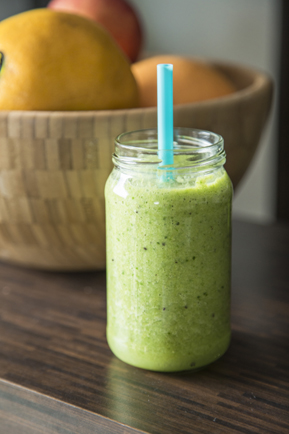 Good food, the most potent part of our day, needs focus. Truly, love, creativity, productive, relaxation, rest, exercise come with it. But where would we be without good food? And what would the focus of our day be like if we didn’t have it?
Good food, the most potent part of our day, needs focus. Truly, love, creativity, productive, relaxation, rest, exercise come with it. But where would we be without good food? And what would the focus of our day be like if we didn’t have it?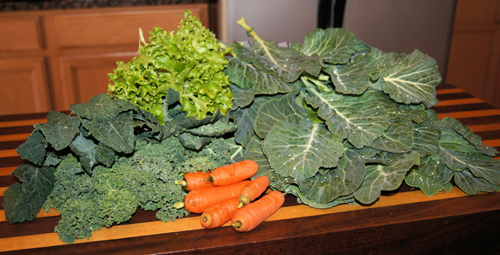
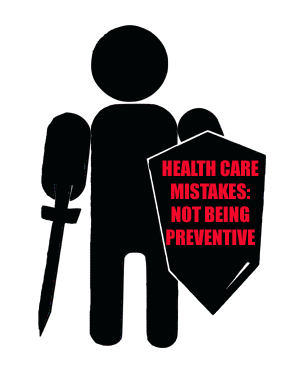 Health care mistakes: our biggest one is not being preventive, a topic very dear to my heart. The topic has been in my purview for some time. The rumblings of this article began with a simple conversation.
Health care mistakes: our biggest one is not being preventive, a topic very dear to my heart. The topic has been in my purview for some time. The rumblings of this article began with a simple conversation.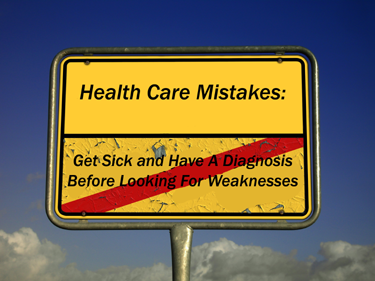 I told him that this is the biggest mistake in all our healthcare system and that I consider it ludicrous. If we believe, and by we, I mean the physicians and dieticians who treat us, that we are asked to get sick and have a diagnosis before looking for weaknesses of which blood is a somewhat good predictor; we are propagating a disease care system, not a health care system. If we believe that it’s important to act well, sleep well, eat well, think well, move well, drink well and measure the result; we will prevent diagnoses often.
I told him that this is the biggest mistake in all our healthcare system and that I consider it ludicrous. If we believe, and by we, I mean the physicians and dieticians who treat us, that we are asked to get sick and have a diagnosis before looking for weaknesses of which blood is a somewhat good predictor; we are propagating a disease care system, not a health care system. If we believe that it’s important to act well, sleep well, eat well, think well, move well, drink well and measure the result; we will prevent diagnoses often. “What if we were to test our vitamin-mineral-phytochemical levels on a regular basis! We would confirm that we were eating well or that we would be wise to adjust a way of eating our nutrients through our daily routine of eating well.”
“What if we were to test our vitamin-mineral-phytochemical levels on a regular basis! We would confirm that we were eating well or that we would be wise to adjust a way of eating our nutrients through our daily routine of eating well.”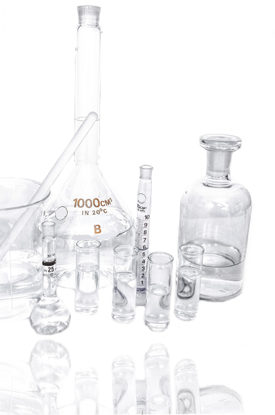 In medical school, much funding comes from pharmaceutical companies, meat. There are also connections to meat, fish and dairy concerns, petro-chemical/pesticide companies, including bioengineering seed companies. What’s important about this is these companies want to sell their products. They want to make a good impression on soon-to-be-doctors who will be advocating care for the goodness of their future patients.
In medical school, much funding comes from pharmaceutical companies, meat. There are also connections to meat, fish and dairy concerns, petro-chemical/pesticide companies, including bioengineering seed companies. What’s important about this is these companies want to sell their products. They want to make a good impression on soon-to-be-doctors who will be advocating care for the goodness of their future patients.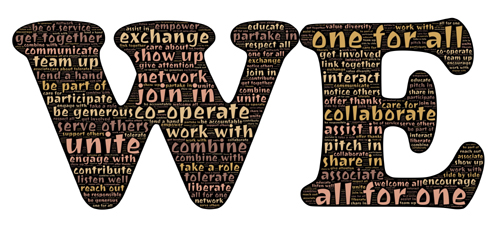 Since Big Pharma’s marketing machine is in place, we could use it for good. Instead of working against an already built corporatocracy, why not figure out a way to subsidize it for helping to market preventive care in place of disease care with the money we save through the nutritional secrets that are revealed! Here’s why this philosophy could be beneficial to all of us.
Since Big Pharma’s marketing machine is in place, we could use it for good. Instead of working against an already built corporatocracy, why not figure out a way to subsidize it for helping to market preventive care in place of disease care with the money we save through the nutritional secrets that are revealed! Here’s why this philosophy could be beneficial to all of us.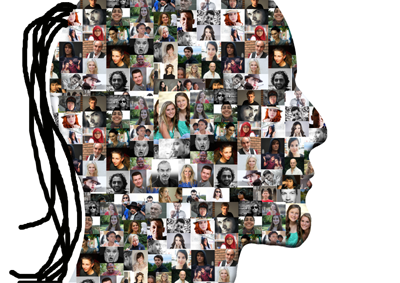 Let us put our heads together, and think on how we can make this work. The example here is only food for thought. Much research and discussion is needed to find the most viable solutions to wellness. If we start today, we will have begun. Let’s take this health care mistake and convert it to health care strategy where we all win.
Let us put our heads together, and think on how we can make this work. The example here is only food for thought. Much research and discussion is needed to find the most viable solutions to wellness. If we start today, we will have begun. Let’s take this health care mistake and convert it to health care strategy where we all win.





